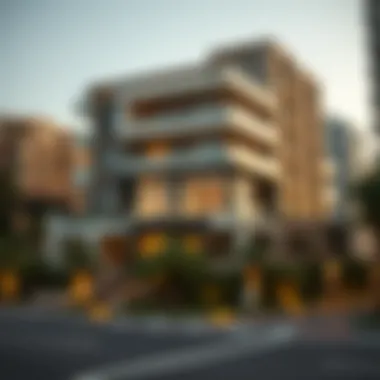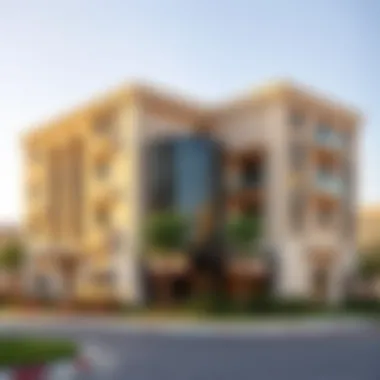Sales Dynamics in Dubai's Real Estate Market Explained


Intro
The vibrant landscape of Dubai's real estate market is more than just a place where skyscrapers kiss the clouds. It’s a tapestry woven with threads of economic vigor, cultural diversification, and a unique blend of local and international influences. This enthralling journey begins with an exploration of the compelling sales dynamics that have made Dubai a focal point for investors, expatriates, and real estate professionals alike.
Navigating this dynamic environment requires a nuanced understanding of various factors at play. For potential buyers and investors, grasping the intricate web of selling behaviors is crucial. This article aims to peel back the layers of Dubai's real estate market, highlighting key points that shed light on current trends and future opportunities.
Market Trends
Current Property Prices
Currently, property prices in Dubai exhibit a mixed bag of performance driven by several factors. Luxury properties, particularly in areas like Palm Jumeirah and Downtown Dubai, have seen a resurgence, with prices reflecting a robust demand as wealthy expatriates eye the sky and sea views. On the other hand, the mid-range segment, particularly in developing neighborhoods such as Dubai Hills Estate, is witnessing a steady increase which signals growing interest among first-time buyers and families seeking spacious living.
- Luxury Segment:
- Mid-Range Segment:
- Palm Jumeirah - Prices reaching highs of AED 50 million for opulent villas.
- Downtown Dubai - High-rise apartments at AED 30 million are not uncommon.
- Dubai Hills Estate - Units landing prices around AED 3 million, attracting families.
- Jumeirah Village Circle - Affordable options from AED 1 million appealing to young professionals.
Future Forecasts
Looking ahead, the trajectory appears bright with forecasts predicting a continued surge in property transaction volumes. The upcoming Expo 2020, although delayed, is anticipated to attract millions of visitors and investors, potentially inflating demand across the market. Coupled with advantageous government policies aimed at stimulating investment, the future of real estate pricing is likely to remain steady or even escalate.
"Dubai's unique blend of luxury and affordability makes it an attractive destination for property investment, presenting opportunities for both short-term gains and long-term investments."
Investment Opportunities
High-ROI Areas
Investors seeking high returns might want to zero in on burgeoning hotspots like Dubai Marina and the Burj Khalifa area. These locations are not only desirable for rental income due to their tourist appeal but also benefit from consistent growth in property values.
- Dubai Marina:
- Jumeirah Lakes Towers (JLT):
- Known for its vibrant nightlife and waterfront views, properties here often experience a high demand from expatriates.
- The area's diverse community and proximity to business hubs make it a sought-after investment locale.
Financing Options
Investors are also presented with flexible financing arrangements easing the burden of entry into the market. Various local banks, such as Emirates NBD and Abu Dhabi Commercial Bank, offer competitive mortgage options suitable for both residents and non-residents. Key factors to consider include the Down Payment rates, which typically range from 20% for first-time buyers, making Dubai's real estate a viable option for many.
For the savvy investor, capitalizing on these patterns and understanding the regulatory environment remains essential to navigate the ongoing changes in the real estate landscape. Taking insights from current figures and potential opportunities equips investors and agents with the tools needed to thrive in this fascinating market.
Useful Links
- For more on Dubai's real estate developments, visit Dubai Land Department.
- To explore economic insights, check World Bank.
- For property listings and market news, refer to Property Finder.
- For deeper analysis on real estate trends, see articles on Investopedia.
Through examining market trends, prices, and opportunities, this article serves as a comprehensive guide for navigating the complexities of Dubai's real estate market.
Understanding the Dubai Real Estate Market
The intricacies of the Dubai real estate market are fascinating. This aspect of the city’s economy is crucial to understand for anyone interested in investing or participating in property transactions. Not only does the real estate sector reflect broader economic trends, but it also influences foreign investment, returns on investment, and even job creation within the region.
What makes Dubai's property market stand out is its dynamic nature, shaped by a diverse expatriate population, a booming economy, and global citings that attract investors from across the globe. The ever-evolving regulatory landscape contributes to fluctuations in market behavior, making it vital for buyers and investors to stay informed.
In this section, we will examine several aspects of the real estate market in Dubai to help you grasp the economic factors that underpin it and the implications for potential buyers and real estate professionals alike.
Overview of Property Sales
In Dubai, property sales have been on a roller coaster ride due to various influences such as economic conditions, investor sentiments, and governmental policies. The market is characterized by a mix of luxury, residential, and commercial properties, each segment demonstrating its own unique dynamics. Here, buyers can find everything from high-end penthouses overlooking the sea to affordable housing projects designed for families and individuals seeking a safe, vibrant community.
Key Economic Indicators
Understanding the key economic indicators is vital when examining the property market in Dubai. They are not just numbers; they tell the story of the market's health and future direction. Let’s delve into some of these indicators and their relevance to the real estate landscape.
Inflation Rates
Inflation impacts purchasing power and, in turn, influences property prices. In Dubai, consumers are continuously at the mercy of inflation rates that fluctuate due to various driving forces, including the global oil prices and economic policies of Gulf states. It’s important to note that higher inflation rates can lead to increased costs for potential buyers. If prices rise too quickly, it could deter new investors or homebuyers, shifting their focus elsewhere.
Interest Rates
Interest rates serve as another significant pillar impacting the sales dynamics in the Dubai real estate market. When central banks adjust rates, it directly affects mortgage availability and costs. Higher interest rates usually mean higher monthly payments for potential homebuyers, which can dampen demand.


Conversely, attractive interest rates can spark a buying frenzy, pushing prices up as demand surges. This phenomenon has been observed in Dubai, where periods of low-interest rates have fueled rapid property sales and a boom in new developments.
Gross Domestic Product
Lastly, the Gross Domestic Product (GDP) encapsulates the overall economic health of Dubai. A growing GDP indicates that the economy is robust, thus providing a fertile ground for real estate investments. Increased activity in sectors like tourism, retail, and trade lifts the demand for properties, driving sales.
However, one must consider that GDP growth does not always translate to real estate booms, especially if there are external shocks or policy changes. Investors should keep an eye on GDP trends, as they provide crucial insights into market cycles.
"Understanding these economic indicators provides a clear framework for making informed decisions in Dubai's real estate market."
In summary, navigating the Dubai property market without understanding the underlying economic indicators is like sailing through stormy seas without a compass. Keeping an eye on inflation rates, interest rates, and GDP can equip investors and buyers with the necessary tools to strategize effectively.
Sales Trends in the Residential Sector
The residential sector represents a vibrant segment of Dubai's real estate market, shaped significantly by changing buyer preferences, economic conditions, and social trends. Understanding sales trends in this area is crucial not just for investors and real estate agents, but also for potential homeowners and expatriates looking to establish their roots in this dynamic city. Analyzing these trends sheds light on where opportunities may lie, offering insights into the behaviors and expectations of buyers across different property segments.
Luxury Residential Properties
Market Demand
The demand for luxury residential properties in Dubai is often a barometer of the city's overall economic health. Recently, there’s been a notable uptick in the market, driven largely by the influx of high-net-worth individuals seeking prestigious assets. This segment is characterized by property features such as stunning views, avant-garde architecture, and exclusive amenities, making them highly desirable.
Moreover, these affluent buyers place a premium on locations like the Palm Jumeirah and Downtown Dubai, where luxury units often come with a hefty price tag. However, it’s not just about the price; buyers also expect a lifestyle that reflects their status. This demand illustrates a broader trend where affluent customers are not just purchasing a home; they are investing in a lifestyle, which can be beneficial for attracting high-profile developments to the market. One downside, however, is the increased competition, which can complicate negotiations for buyers accustomed to exclusive options in the market.
Investment Opportunities
The investment landscape for luxury residential properties in Dubai is quite fertile. A critical aspect is the real estate market’s resilience, often showcased by its capacity to bounce back from economic downturns. Investors see this segment as an attractive option due to the potential for substantial returns over time. The unique feature of these investments is the ability to not only gain capital appreciation but also generate rental income from high-demand areas.
Nonetheless, potential investors should be mindful of market saturation risks. With many luxe offerings, it’s essential to conduct thorough due diligence to identify the right opportunities, so that investments don’t turn sour due to oversupply or mispriced assets.
Mid-Range Housing
Buyer Profiles
The mid-range housing market attracts a diverse group of buyers, including local families, expats, and young professionals. Typically, these individuals are looking for a balance between affordability and quality. A defining characteristic of this segment is that buyers often have slightly different priorities compared to those in the luxury sector. They tend to focus on functional layouts, proximity to schools, and access to amenities like parks and shopping centers.
This buyer profile is beneficial for developers as it presents opportunities for tailored projects that meet specific needs. However, this segment also faces challenges. With so many options, buyers can be quite discerning, leaning towards developments that offer added value or unique amenities. If these needs aren’t met, it can stall sales momentum in this sector.
Popular Areas
Certain areas have emerged as hotspots for mid-range housing in Dubai, such as Dubai Marina and Meydan. These locations are appealing due to their blend of lifestyle and convenience. The key characteristic of these areas is their strategic positioning; they often provide easy access to transportation, workplaces, and leisure activities.
The unique feature of these neighborhoods is their community vibe, which attracts families and younger buyers alike. However, as demand increases in these areas, prices can escalate quickly, impacting affordability for some. Buyers should weigh the advantages against potential financial strains, making informed decisions based on long-term goals.
Affordable Housing Initiatives
The need for affordable housing in Dubai has become increasingly critical, particularly as the population grows and more expatriates seek homes. Affordable housing initiatives aim to bridge the gap for those looking to purchase without breaking the bank. The government has stepped in to support these initiatives, recognizing their importance in fostering a balanced real estate market.
Through various programs, such as reduced purchasing costs and incentives for developers, the goal is to increase the availability of budget-friendly options. This focus not only addresses the immediate housing needs of lower-to-middle-income citizens but also contributes to the social fabric of the city by promoting inclusivity.
Nevertheless, challenges remain in the execution of these initiatives. Regulatory hurdles and land availability can slow the process, making it imperative for policymakers to streamline efforts.
Providing affordable housing is not just about offering lower prices; it’s about fostering environments where communities can thrive, enhancing the overall urban landscape.
In summary, the sales trends in the residential sector reveal a multifaceted market where various properties appeal to different buyer segments. Whether it's luxury offerings that symbolize success or affordable options aimed at ensuring everyone has a place to call home, the dynamics at play are essential for understanding Dubai's real estate landscape.
Commercial Property Sales
The landscape of commercial property sales in Dubai is a vibrant tapestry that reflects the city's economic resilience and potential. This subsection highlights how commercial real estate is not just a segment but a critical driver of overall market dynamics. Understanding commercial property transactions offers insight into investment opportunities, business landscapes, and urban development strategies. As more companies seek to establish a foothold in this thriving market, recognizing the implications of such sales becomes imperative for investors and stakeholders alike.
Office Space Demand
Emerging Business Hubs
Emerging business hubs in Dubai are redefining the commercial property landscape. Areas like Dubai Silicon Oasis and Dubai Design District are not just locations; they are ecosystems fostering innovation and collaboration. The key characteristic of these hubs is the blend of accessibility, modern infrastructure, and lifestyle amenities. This makes them attractive for startups and established companies alike.
A unique feature of these emerging business hubs is their focus on sustainability and smart technologies. This approach not only appeals to environmentally conscious businesses but also meets the demands of a modern workforce that values flexibility and a conducive working environment. However, with rapid development comes increased competition, which can drive prices up, potentially making it challenging for smaller enterprises to secure spaces.
Trends in Co-Working Spaces
The rise of co-working spaces is another noteworthy trend impacting commercial property sales. These communal work environments are popular among freelancers, small startups, and even larger companies looking for flexible arrangements. A key characteristic of co-working spaces is their ability to provide an affordable alternative to traditional office rentals, fostering a sense of community among diverse professionals.


What sets these spaces apart is their emphasis on flexibility and collaboration. While they offer lower overhead costs, there are disadvantages to consider. For instance, noise and distractions can negatively impact productivity. Nonetheless, the increasing demand for such spaces reflects a significant shift towards more adaptable working conditions, which future commercial property trends must address.
Retail Space Dynamics
Impact of E-commerce
The impact of e-commerce on retail spaces is profound. As online shopping continues to grow, traditional retail spaces are re-evaluating their strategies. This shift highlights the importance of physical locations as experience centers rather than just sales points. A key characteristic of this transition is that retailers are increasingly incorporating technology in their stores.
The unique feature of this impact is how it forces landlords to reconsider leasing strategies, sometimes leading them to lower rents or offer incentives to retain tenants. Despite these challenges, incorporating experiential retail can still provide advantages, resulting in increased foot traffic and customer engagement for brick-and-mortar locations.
Shopping Malls vs. High Streets
The debate between shopping malls and high streets remains central to retail space dynamics. Shopping malls offer a controlled environment with a variety of amenities and attractions. Their key characteristic is the all-in-one experience they bring to consumers, providing shopping, dining, and entertainment under one roof.
On the other hand, high streets are often characterized by their vibrant atmosphere and mix of independent retailers. This setting encourages foot traffic but can pose challenges when competing against the convenience of shopping malls. The unique downside of high streets is the potential fluctuation in foot traffic due to external factors like weather or urban development. Yet, the charm of high streets can be an undeniable draw for consumers seeking unique shopping experiences that larger retail spaces may lack.
"The evolution of retail space dynamics demonstrates an urgent need for adaptability in commercial property sales strategy."
For stakeholders in Dubai's commercial real estate market, comprehending these ongoing trends is critical. They set the stage for how businesses engage with their environments and how investors can capitalize on shifting tides in consumer behavior and preference.
Government Regulations Impacting Sales
Understanding the regulatory landscape is essential for anyone involved in Dubai's real estate market. Government regulations shape property transactions, protect buyer interests, and help ensure a level playing field in the industry. They can either bolster investor confidence or, conversely, create hurdles that slow down sales. Thus, grasping these regulations is critical for strategic decision-making.
Ownership Laws
Ownership laws in Dubai have evolved significantly over the years, making the market more accessible to foreign investors. Initially, property ownership was restricted to UAE nationals, but substantial reforms now allow foreigners to own property in designated areas, known as freehold zones. These zones present various benefits such as:
- Full ownership rights: Investors can buy and hold properties without restrictions.
- Investment security: These laws enhance buyer confidence, knowing their investment is legally protected.
- Return on investment potential: Easy ownership encourages more investors, driving demand and potentially increasing property values.
However, it’s paramount to understand the specifics associated with ownership laws, especially concerning different property types, such as residential versus commercial. For instance, buying property in a freehold area typically comes with fewer complications than transactions in leasehold areas. As potential buyers assess their options, comprehensive awareness of these laws can either unlock opportunities or risk setbacks, making thorough due diligence a must before making a purchase.
Taxation and Incentives
When it comes to taxation and incentives, Dubai's real estate sector shines brightly due to favorable policies. The absence of property taxes on residential properties is a significant draw for investors. Prospective buyers should note the following taxation aspects:
- No property tax: Unlike many global cities, Dubai does not impose a tax on residential properties, allowing buyers to maximize their return on investments.
- Low transaction fees: The Dubai Land Department sets transaction fees at around 4% of the property value, which is relatively low compared to other major markets.
- Incentives for buyers: Various programs, such as the Dubai Land Department's initiatives to simplify property buying procedures, can further support investments.
Despite these advantages, it's vital for buyers to navigate potential challenges, such as fees associated with mortgages or the costs incurred in property management. Potential investors should conduct a careful assessment of these nuances to understand how they fit into their financial strategies.
"Understanding government regulations is key not just for compliance, but for maximizing investment potential in Dubai's dynamic market."
For additional research, check investopedia.com and britannica.com.
Engaging with regulatory frameworks isn’t just a box-ticking exercise; it’s integral to navigating the real estate tide effectively.
Investor Sentiment and Behaviors
The interactions of buyers and sellers in any real estate market reveal deeper patterns that go beyond mere numbers and statistics. Understanding investor sentiment and behaviors in Dubai is crucial for anyone looking to navigate this vibrant market. These sentiments speak volumes about the current climate, future expectations, and potential investment opportunities that may arise.
Foreign Investment Trends
Dubai has traditionally attracted foreign investors like moths to a flame. Its no surprise, given how the emirate has positioned itself as a global hub for trade and tourism. Investments from countries such as India, China, and the UK have surged over the years, attracted by the promise of lucrative returns and a favorable regulatory environment.
Here are some factors influencing this foreign investment trend:
- Strong Economic Outlook: Dubai’s economy has shown resilience, bouncing back from market fluctuations. The recovery post-COVID-19 has been encouraging, showcased by rising property sales and rentals.
- Diverse Property Options: From luxurious villas on the Palm Jumeirah to chic apartments in Downtown Dubai, the variety entices varied buyer profiles. Investors seeking diverse exposure find it hard to resist.
- Tax Benefits: The lack of property taxes and the absence of income taxes create an appealing environment for foreign investors.
Despite challenges such as rising construction costs and global economic uncertainties, the allure of Dubai's property market continues to draw investors from all corners of the globe.
Local vs. Expatriate Buyers
The landscape of buyers in Dubai is a melting pot—locals and expatriates play pivotal roles in shaping the market. Understanding their behaviors offers insights into the dynamics at play.
Local Buyers
- Cultural Ties: Local buyers often have a sentimental connection to their homeland, fueling demand for properties that reflect cultural heritage.
- Stable Incomes: Generally benefiting from governmental support and stable job sectors, local buyers have increased purchasing power.
Expatriate Buyers
- Global Outlook: Expatriates tend to look beyond immediate needs, eyeing properties as investments meant for both personal use and rental income.
- Diverse Preferences: Preferences can vary greatly, influenced by familiarity with global trends. While some might target high-end luxury properties, others aim for more modest accommodations to maximize value.


The split between local and expatriate buyers enriches the Dubai real estate scene and creates a competitive market environment. Each group brings its own unique motivations and expectations, forming a tapestry of sentiments that shapes the overall behavior in the market.
"Understanding the motivations and behaviors of various buyer profiles can unlock new opportunities in the real estate market."
As Dubai continues to grow and evolve, monitoring the ebb and flow of investor sentiment will be key for anyone involved in real estate here.
Challenges and Risks in the Market
In any bustling market like Dubai's real estate, understanding the challenges and risks is crucial for anyone looking to engage in buying or selling properties. It helps navigate the often turbulent waters of real estate transactions, ensuring that investors and buyers can make well-informed decisions.
Real estate can be a great avenue for earning substantial returns, but it can also be fraught with uncertainties. The market volatility and regulatory changes are two key areas that can significantly impact sales dynamics. Addressing these factors is not just an academic exercise but a necessity for anyone involved in Dubai's property landscape.
Market Volatility
Market volatility in Dubai’s real estate sector is a significant concern for investors. Prices can fluctuate wildly, sometimes based on global economic conditions or even local policies. One year you might see a boom in luxury apartment sales, while the next, mid-range housing may see an unexpected dip. These fluctuations can be attributed to several things:
- Economic trends: Local and international economic shifts can cause rapid changes in buyer confidence.
- Speculative activities: Some properties may appreciate based on speculation rather than real demand, introducing risk for investors.
With each rise in property value, there's an equal chance of a fall. Investors should closely monitor the market, assess their risk tolerance, and brace for short-term setbacks in pursuit of long-term gains.
"In the buyer's realm, keeping a keen eye on market shifts is akin to catching the first hint of a storm on the horizon."
Regulatory Changes
The second area of concern is regulatory changes. Laws governing property ownership, taxes, and other factors can shift dramatically. While Dubai generally promotes foreign investment through favorable policies, sudden rule changes might sour the landscape. Considerations include:
- Ownership Laws: New restrictions or changes could limit who can buy property, which directly impacts the market's accessible audience.
- Tax Structures: Adjustments in taxation could alter the attractiveness of investing in the market.
As policies evolve, it’s essential for stakeholders, including agents, buyers, and investors, to stay informed. Monitoring official announcements, and engaging with local real estate experts will help navigate these sometimes murky waters.
Technological Advancements in Sales Processes
The real estate landscape in Dubai is continuously evolving, thanks in large part to advancements in technology. This evolution is crucial for keeping sales processes efficient and transparent, and adapting to the rapidly changing demands of the market. With the high-value nature of property transactions in Dubai, incorporating cutting-edge tools is not just a luxury; it’s become a necessity for real estate professionals, buyers, and investors alike.
Role of Real Estate Technology
Technology is the backbone of modern real estate operations. It streamlines everything from property listings to transactions, providing a smooth experience for all parties involved.
- Data Analysis Tools: These tools allow agents to assess market conditions, understand buyer preferences, and predict future trends. By leveraging big data, agents can craft personalized marketing strategies that resonate with potential buyers.
- CRM Systems: Customer Relationship Management systems help agents manage their relationships with clients more effectively. With software tailored for real estate, they can track interactions, set reminders for follow-ups, and analyze customer data to improve service.
- Blockchain Technology: This is making waves in ensuring transparency and security in property transactions. By recording contracts on an immutable ledger, blockchain can drastically reduce fraud and minimize the risks associated with property sales.
Virtual Tours and Online Transactions
In a climate where convenience is king, virtual tours and online transactions have redefined how properties are marketed and sold.
- Virtual Tours: These immersive tools allow potential buyers to explore properties from the comfort of their homes. It saves time and resources for both the buyer and seller, making the initial vetting process more efficient. Furthermore, with advancements in virtual reality, these tours can feel surprisingly close to being physically present in the space.
- Online Transactions: The ability to conduct transactions online is a game-changer. It simplifies due diligence and closing processes. Buyers can submit their offers, conduct negotiations, and review documents without the need for face-to-face meetings.
- Impact on the Market: The popularity of remote transactions is particularly beneficial for expat buyers who may not be able to travel to Dubai. They can invest without needing to set foot in the country. Also, by promoting accessibility, these tech options are helping open up the market to a broader audience than ever before.
"The digitization of real estate sales processes is not just a trend; it's paving the way for the future of how transactions are conducted in Dubai."
For further reading on technology in real estate, check out Wikipedia on Real Estate Technology.
Future Outlook of Sales in Dubai
Understanding the future outlook of sales in Dubai's real estate sector is crucial for various stakeholders, including investors, agents, expatriates, analysts, and potential buyers. This section serves as a compass, indicating the direction in which the market is headed. Grasping future trends helps these investors make informed decisions while navigating an ever-changing market landscape. What stands out in this outlook is the blend of short-term predictions and long-term trends, which provides a holistic view of what to expect in the evolving real estate environment.
Short-term Predictions
In the short run, various factors influence property sales in Dubai. With the world slowly adapting post-pandemic, more people are finding their footing again. Investors may notice a slight uptick in buyer sentiment driven mainly by the upcoming Expo 2020 and improvements in employment rates. Many foresee a modest growth rate in property prices and an increase in sales transactions within the next year.
A close watch on other emerging markets can provide valuable pointers; for instance, if neighboring regions stabilize economically, they may draw attention away from Dubai temporarily, affecting short-term sales dynamics.
Long-term Trends
Market Recovery
Market recovery plays a pivotal role in revitalizing Dubai's real estate scene. The key characteristic of this recovery is the increasing confidence among buyers and sellers alike. Investors are becoming more optimistic, as signs of stabilization emerge in both residential and commercial sectors.
This recovery trend is beneficial as it brings renewed enthusiasm from foreign investors, making Dubai an appealing choice again. The unique feature of market recovery is its cyclical nature; as economic conditions improve, markets tend to bounce back. While advantages abound, challenges also exist, such as potential over-speculation or increased competition that could impact pricing.
Sustainable Development
Sustainable development has risen to prominence in Dubai's future real estate sales outlook. As people become more environmentally conscious, this aspect of development becomes not just a trend but a necessity. The focus is shifting toward eco-friendly constructions that prioritize energy efficiency and resource sustainability.
The key characteristic here is alignment with global sustainability goals, making it a popular choice. This approach enhances the appeal of properties in an increasingly discerning market. However, potential drawbacks include higher initial development costs and the need for ongoing maintenance, which could deter some investors.
The combination of market recovery and sustainable development offers a compelling narrative for Dubai's real estate landscape moving forward. Embracing these trends can lead to a robust market, one that is adaptive and resilient.
"A clear understanding of the future landscape can make a world of difference when navigating Dubai's real estate market."
For more information on property trends and developments: Wikipedia on Real Estate in Dubai and Britannica on Dubai's Economy.



